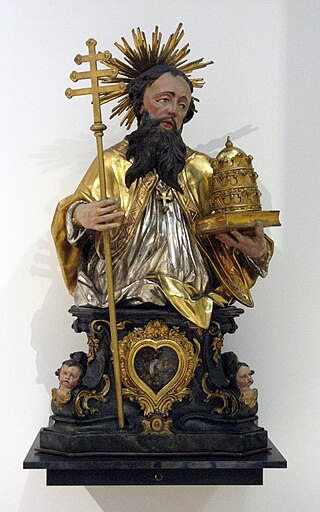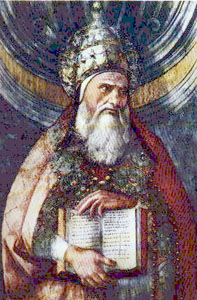A list of people, who died during the 2nd century, who have received recognition as Saints (through canonization) from the Catholic Church:
A list of people, who died during the 2nd century, who have received recognition as Saints (through canonization) from the Catholic Church:

Pope Linus was the bishop of Rome from c. AD 67 to his death. He is generally regarded as the second Bishop of Rome, after St. Peter. As with all the early popes, he was canonized.

Pius I was the bishop of Rome from c. 140 to his death c. 154, according to the Annuario Pontificio. His dates are listed as 142 or 146 to 157 or 161, respectively. He is considered to have opposed both the Valentinians and Gnostics during his papacy. He is considered a saint by the Catholic Church and the Eastern Orthodox Church with a feast day in 11 July, but it is unclear if he died as a martyr.

Pope Callixtus I, also called Callistus I, was the bishop of Rome from c. 218 to his death c. 222 or 223. He lived during the reigns of the Roman emperors Elagabalus and Alexander Severus. Eusebius and the Liberian catalogue list his episcopate as having lasted five years (217–222). In 217, when Callixtus followed Zephyrinus as Bishop of Rome, he started to admit into the Church converts from sects or schisms. He was martyred for his Christian faith and is venerated as a saint by the Catholic Church.

Polycarp was a Christian bishop of Smyrna. According to the Martyrdom of Polycarp, he died a martyr, bound and burned at the stake, then stabbed when the fire failed to consume his body. Polycarp is regarded as a saint and Church Father in the Catholic, Eastern Orthodox, Oriental Orthodox, Anglican, and Lutheran churches.

Western Christianity is one of two subdivisions of Christianity. Western Christianity is composed of the Latin Church and Western Protestantism, together with their offshoots such as the Old Catholic Church, Independent Catholicism and Restorationism.

Pope Soter was the bishop of Rome from c. 167 to his death in c. 174. According to the Annuario Pontificio, the dates may have ranged from 162–168 to 170–177. He was born in Fondi, Campania, today in the Lazio region of Italy. Soter is known for declaring that marriage was valid only as a sacrament blessed by a priest and also for formally inaugurating Easter as an annual festival in Rome. His name, from Greek Σωτήριος from σωτήρ "saviour", would be his baptismal name, as his lifetime predates the tradition of adopting papal names.

Maron, also called Maroun or Maro, was a 4th-century Syriac Christian hermit monk in the Taurus Mountains whose followers, after his death, founded a religious Christian movement that became known as the Maronite Church, in full communion with the Holy See and the Catholic Church. The religious community which grew from this movement are the modern Maronites.
The Apostolic Fathers, also known as the Ante-Nicene Fathers, were core Christian theologians among the Church Fathers who lived in the 1st and 2nd centuries AD who are believed to have personally known some of the Twelve Apostles or to have been significantly influenced by them. Their writings, though widely circulated in early Christianity, were not included in the canon of the New Testament. Many of the writings derive from the same time period and geographical location as other works of early Christian literature which came to be part of the New Testament.

The Epistle of Ignatius to the Smyrnaeans is an epistle from circa 110 A.D. attributed to Ignatius of Antioch, a second-century bishop of Antioch, addressed to the Early Christians in Smyrna.
A list of people, who died during the 3rd century, who have received recognition as Saints from the Catholic Church:
A list of people, who died during the 4th century, who have received recognition as Blessed or Saint from the Catholic Church:
A list of people, who died during the 5th century, who have received recognition as Blessed or Saint from the Catholic Church:
A list of people, who died during the 6th century, who have received recognition as Saints from the Catholic Church:
A list of people, who died during the 8th century, who have received recognition as Blessed or Saint from the Catholic Church:
Confessor of the Faith is a title given by some Christian denominations. In Catholicism and Eastern Orthodoxy, Christians who professed their faith in times of Christian persecution and therefore had to suffer persecution, expulsion, torture, mutilation and imprisonment, but not directly undergo martyrdom, are called confessors. Later, popes, bishops, abbots, kings and hermits were also counted among the confessors.

Christianity in the 8th century was much affected by the rise of Islam in the Middle East. By the late 8th century, the Muslim empire had conquered all of Persia and parts of the Eastern Roman (Byzantine) territory including Egypt, Palestine, and Syria. Suddenly parts of the Christian world were under Muslim rule. Over the coming centuries the Muslim nations became some of the most powerful in the Mediterranean basin.

The following outline is provided as an overview of and topical guide to Christianity:

The Church Fathers, Early Church Fathers, Christian Fathers, or Fathers of the Church were ancient and influential Christian theologians and writers who established the intellectual and doctrinal foundations of Christianity. The historical period in which they worked became known as the Patristic Era and spans approximately from the late 1st to mid-8th centuries, flourishing in particular during the 4th and 5th centuries, when Christianity was in the process of establishing itself as the state church of the Roman Empire.
Articles related to Christianity include: